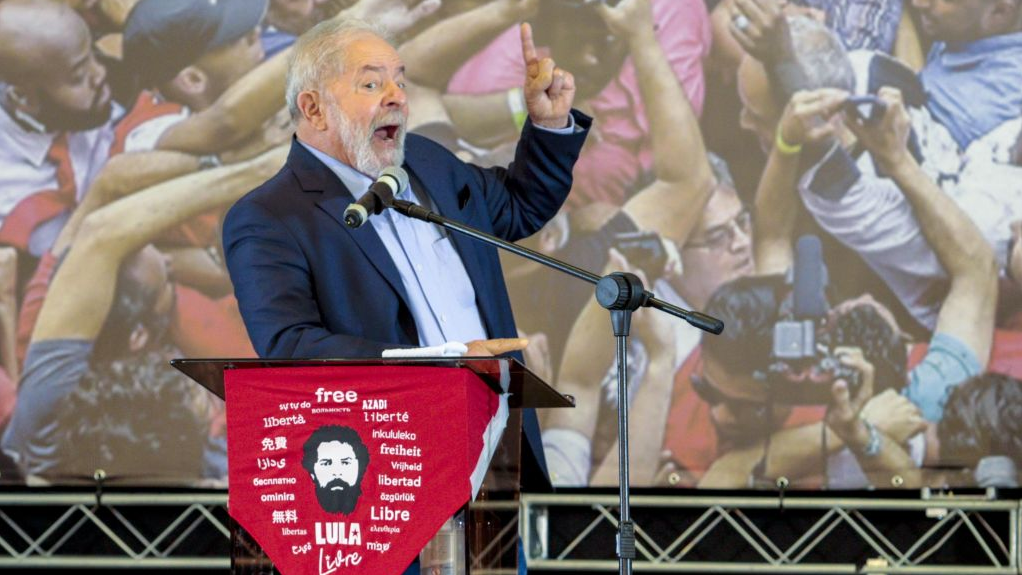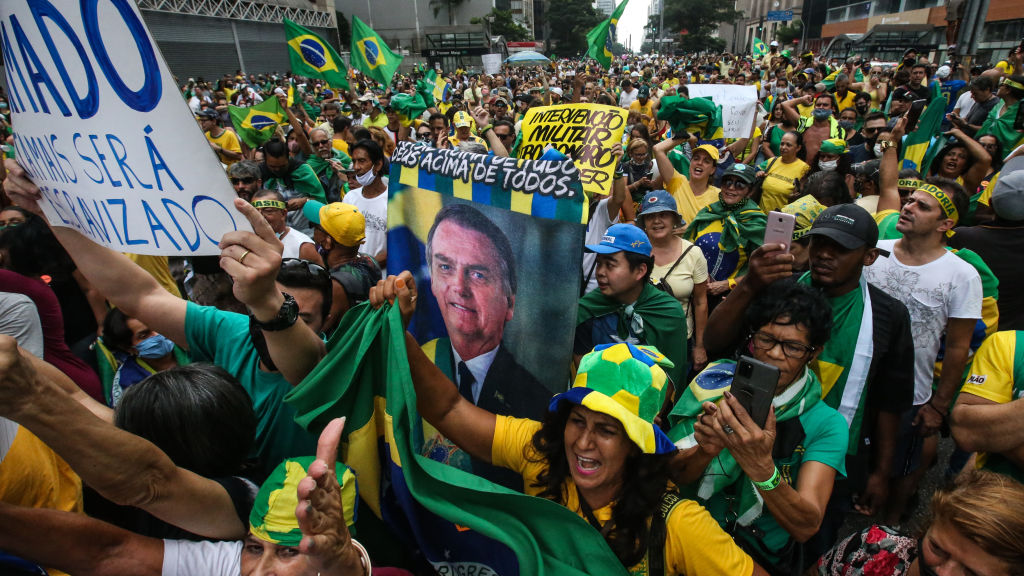
Former Brazilian President Lula da Silva holds a press conference at the metalworkers' union building in Sao Bernardo do Campo, in Sao Paulo, Brazil, March 10, 2021. /Getty
Former Brazilian President Lula da Silva holds a press conference at the metalworkers' union building in Sao Bernardo do Campo, in Sao Paulo, Brazil, March 10, 2021. /Getty
Editor's note: Guy Burton is an adjunct professor at Vesalius College, Brussels. The article reflects the author's opinions and not necessarily the views of CGTN.
Next year Brazil may get the election that it was denied in 2018. This week one of its former presidents, Luiz Inacio "Lula" da Silva, moved a step closer to having his political rights restored to him. He lost them in the runup to the last time round, when he was prosecuted and convicted for corruption and money laundering through involvement in the "Operation Carwash" scandal.
Lula's path towards next year's presidential election was opened on March 8 when a judge in Curitiba concluded that the court which prosecuted Lula in that state had not had jurisdiction to do so. It now goes to the Supreme Court, which if it upholds the appeal, could lead to a retrial. Lula's appeal rests on the fact that the judge who investigated Lula did not do so impartially.
Should Lula be able to stand he would most likely take on the current right-wing president, Jair Bolsonaro. Bolsonaro had an arguably easier run to the presidency given Lula's absence. He harnessed the public anger against the political class, which they saw as corrupt, and their frustration at their failure to bring Brazil out of a deep economic recession after 2014.
Bolsonaro presented himself as a political outsider and contrasted the miserable state of Brazil with the higher levels of economic growth and political order, especially during the early years of the military dictatorship in the 1960s. As a result, many on the center and left were fearful that Bolsonaro might try and turn the clock back, especially as he began appointing military men into his government.
Despite his authoritarian tendencies however, Bolsonaro has been partly held in check. More critical elements of the media have refused to bow to the president and continued to scrutinize his government's performance. Bolsonaro has also discovered the difficulty of governing without parliamentary support. Over the past year, he has built a governing coalition with center-right politicians in Congress and now engages in the pork barrel politics he previously decried. Partly as a result, some of the earlier demands for his impeachment have now receded.
It also means that Bolsonaro has now reached the halfway point of his administration. That means he will find it harder to campaign as an outsider again next year. Indeed, Lula will likely use his record in government against him.
Moreover, it is a poor one. Bolsonaro has received strong criticism from both inside and outside Brazil on his handling of the COVID-19 pandemic. Both his attitude and behavior have been those of denial, similar to that of the former American President Donald Trump. Bolsonaro questioned efforts to contain the virus last year, opposing movement restrictions put in place by the country's mayors and state governors as well as undermining his own health ministers. He has continued to reject advice on masks and held rallies with his supporters, even after he contracted COVID-19 himself. Today, Brazil is one of the worst affected countries in the world, with more than 11.4 million cases and over 278,000 deaths and the emergence of new, more potent strains of the virus.
However, criticism of Bolsonaro has its limits. According to the Datafolha polling firm, although around a half of voters have consistently judged Bolsonaro's performance as poor since the start of last year and nearly two-thirds currently think the pandemic is out of control, fewer think that Bolsonaro is solely to blame for this. Instead, they appear to apportion blame across the political spectrum: the health minister and state governors have also been judged to be performing poorly.
Bolsonaro may feel some confidence ahead of next year's election. Even though there is still plenty of time before the campaign begins in earnest from the middle of 2022, he can count on a relatively solid and consistent base of support. Since the start of his presidency, around a quarter to a third of the electorate have continued to approve of him, among them evangelicals, those living in the south of the country and with higher levels of income. Recent polls suggest that around one third of the electorate would vote for Bolsonaro in the first round of the election.

Supporters of Brazilian President Jair Bolsonaro protest and hold banners during a motorcade and demonstration in favor of the government amidst the coronavirus (COVID-19) pandemic in Avenida Paulista in Sao Paulo, Brazil, March 14, 2021. /Getty
Supporters of Brazilian President Jair Bolsonaro protest and hold banners during a motorcade and demonstration in favor of the government amidst the coronavirus (COVID-19) pandemic in Avenida Paulista in Sao Paulo, Brazil, March 14, 2021. /Getty
Like Bolsonaro, Lula generates strong feelings from both supporters and opponents. Currently, he has 20 percent support in opinion polls, putting him further ahead of all other candidates. His strongest support comes from the poorer and less educated sections of society and is concentrated in the northern parts of the country. At the same time, there are many more conservative and financially affluent Brazilians who are deeply opposed to Lula and will never vote for him, whatever the circumstances.
That loathing towards Lula was evident on March 9, when financial markets fell on the news of his possible return. Some feared that it would encourage Bolsonaro to loosen fiscal policy in response while others worried what another Lula government might mean for Brazil's finances and economy.
However, this is somewhat ironic for two reasons. First, government spending is already loose. Last year, the budget deficit reached a record high that was equal to 11 percent of GDP when the government bowed to congressional pressure to provide emergency support in response to the pandemic. Second, despite Lula and his successor, Dilma Rousseff, being from the leftist Workers' Party (Partido dos Trabalhadores or PT), their governments adopted broadly conservative economic policies that were welcomed and supported by the business elite.
The PT may hope that memories of good economic times under Lula may help them both in the elections next year. Certainly, Lula will be a more charismatic candidate than Fernando Haddad, the former Sao Paulo mayor and Lula's former education minister, was.
At the same time though, it is a sad indictment that Lula remains the PT's best chance of regaining the presidency. The PT was born out of the trade unions and social movements which emerged in opposition to the military government in the 1980s – the same one that Bolsonaro now celebrates. When Lula stood in his first presidential election in 1989, he was one of many leaders the PT had to offer. That there seems to be no one else with the stature of Lula 30 years later reflects poorly on Brazil's left.
(If you want to contribute and have specific expertise, please contact us at opinions@cgtn.com.)

